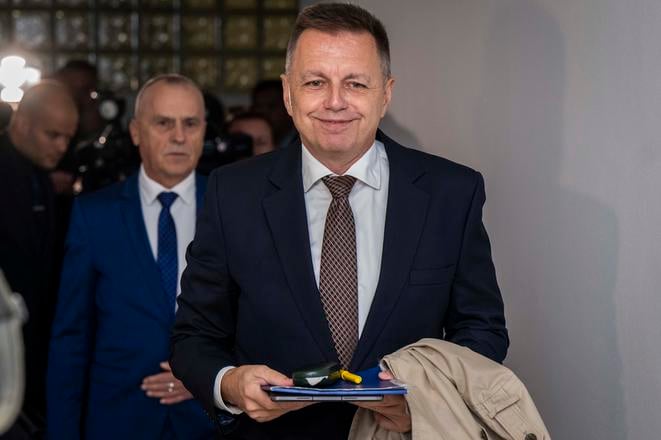Peter Kažimír, the governor of Slovakia’s central bank and a former finance minister for Smer, is very likely to escape a final verdict in a high-profile corruption case following amendments to criminal laws introduced earlier this year by Robert Fico’s government.
The governor, whose term ends in June 2025, is suspected of having bribed František Imrecze, then head of the Financial Administration (Slovakia’s tax authority), in 2017 with €48,000 to assist his acquaintance, Ladislav Rehák, a once-influential businessman and former agent for the Czechoslovak communist secret police (ŠtB). Imrecze, a key witness in the corruption case, allegedly expedited tax appeal proceedings filed by Rehák’s firm, Loject.
Kažimír, who left his ministerial post in 2019, had rented a large house from S. I. Developer, a company owned by Rehák, before purchasing it from him in 2020. According to media reports at the time, Kažimír could not afford the expensive property on his declared income.
However, the ongoing trial revealed in October that Kažimír had received €1 million from a company to which he had provided a loan - not mentioned in Kažimír’s asset declaration - and had withdrawn €60,000 from a cash machine around the time the alleged bribery took place.
Kažimír, who was charged in 2021, continues to deny any involvement in bribery, despite a judge issuing a €100,000 penal order last year—an action that signalled the judge’s confidence in the former minister’s culpability. However, the prosecutor and Kažimír appealed, leaving the case unresolved.
“This judicial farce simply continues,” the governor said in mid-October, expressing hope that Judge Milan Cisarik would dismiss his case following Constitutional Court-approved changes to criminal laws. These amendments, among other things, shortened the statute of limitations for corruption cases (with exceptions for cases involving EU finances – Ed.).
The dismissal was also requested by Kažimír’s lawyer, Ondrej Mularčík.
The judge argued that legal experts and judges could not agree on whether these changes should also apply to ongoing cases. Cisarik believed that they should not and that the Kažimír trial should proceed. However, the Supreme Court ruled at the end of November that the approved legal amendments should also apply to ongoing cases, including the near-conclusion of the Kažimír trial.


 National Bank of Slovakia Governor Peter Kažimír arrives at the Specialised Criminal Court in Pezinok on October 11, 2024. (source: TASR – Jakub Kotian)
National Bank of Slovakia Governor Peter Kažimír arrives at the Specialised Criminal Court in Pezinok on October 11, 2024. (source: TASR – Jakub Kotian)